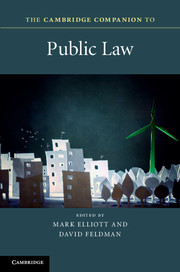Book contents
- Frontmatter
- Contents
- Notes on Contributors
- Introduction
- 1 The distinctiveness of public law
- 2 The politics of public law
- 3 The rule of law in public law
- 4 Legislative supremacy in a multidimensional constitution
- 5 The politics of accountability
- 6 Rights and democracy in UK public law
- 7 Public law values in the common law
- 8 Public law and public laws
- 9 Public law and privatisation
- 10 State architecture: subsidiarity, devolution, federalism and independence
- 11 Soft law never dies
- 12 The impact of public law litigation
- 13 Designing and operating constitutions in global context
- Index
- References
8 - Public law and public laws
Published online by Cambridge University Press: 05 September 2015
- Frontmatter
- Contents
- Notes on Contributors
- Introduction
- 1 The distinctiveness of public law
- 2 The politics of public law
- 3 The rule of law in public law
- 4 Legislative supremacy in a multidimensional constitution
- 5 The politics of accountability
- 6 Rights and democracy in UK public law
- 7 Public law values in the common law
- 8 Public law and public laws
- 9 Public law and privatisation
- 10 State architecture: subsidiarity, devolution, federalism and independence
- 11 Soft law never dies
- 12 The impact of public law litigation
- 13 Designing and operating constitutions in global context
- Index
- References
Summary
This chapter is concerned with the extent to which we should think in terms of ‘public law’ or ‘public laws’. The topic is perennial. There has been debate in relation to most legal subjects as to whether we should, for example, think in terms of a law of contract or laws of contract, the latter capturing the idea that there are different bodies of law applicable to contracts of sale, employment, shipping, hire purchase and the like. So too in the realm of public law, there has been discourse as to whether the subject should be perceived in functional terms, in recognition of subject matter as diverse as social welfare and planning, tax and asylum, and utilities regulation and mental health.
While the topic is thus perennial there is also a sense in which it is under-theorized, in relation to public law at least. This is because the very idea of ‘functional’ public law that betokens an element of diversity conceals a range of more distinct ideas that must be disaggregated for the sake of analytical and normative clarity. This chapter is not predicated on the assumption that there is only ‘one’ correct meaning to be ascribed to the idea of functional public law. It is, however, premised on the assumption that clarity as to the sense in which the term is being used is a condition precedent to reasoned analysis concerning its utility. The ensuing discussion therefore explores four different ways in which the idea of a functional public law is used.
Different subject matter rules
We can begin with the most straightforward and least controversial, and thus clear the ground. There is no doubt that we have a regime of public laws insofar as this captures the idea that there are distinct subject matter rules in relation to mental health, education, housing, tax, asylum and the plethora of other areas that the state regulates. To make clear, the term ‘subject matter rules’ connotes here the detailed statutory provisions that regulate the relevant area, whether this concerns access to welfare benefits, tax liability, the conditions for seeking asylum, or the circumstances in which a person can be sectioned pursuant to mental health legislation. This is self-evidently so, and no one would deny it.
- Type
- Chapter
- Information
- The Cambridge Companion to Public Law , pp. 153 - 171Publisher: Cambridge University PressPrint publication year: 2015

